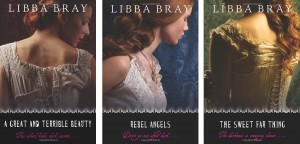11 Feb / The Gemma Doyle Trilogy: A Great and Terrible Beauty, Rebel Angels, and The Sweet Far Thing by Libba Bray

Here’s a dilemma: If you knew how much a book series might deteriorate by its final title, would you read all the way through to the bitter end? As contrary as I am, I probably would … but I have to admit that in the case of this Gemma Doyle three-parter by mega-bestselling author Libba Bray, had I known that the first installment’s title ironically proves to be a fitting warning – A Great and Terrible Beauty, as in the series goes from great to downright terrible – I would definitely have moved on to better pages. And yet, almost 2000 pages (or 46 hours if you’ve gone audible), here I am …
Let’s start with ‘great.’ On her 16th birthday, Gemma Doyle, the daughter of an English family based in India, has a fight with her mother. She runs off into a Bombay market, then has a violent vision of her mother’s death – by her own hand – which proves to be true. The family abandons India, and Gemma is shipped off to Spence Academy outside London, where Gemma will learn “the necessary skills to become [one of] England’s future wives and mothers, hostesses and bearers of the Empire’s feminine traditions.” This is 1895 Victorian England, after all …
Initially an outcast, Gemma bonds soon enough with her mousy roommate Ann, alpha girl Felicity, and the ever-gorgeous Pippa. She discovers a quarter-century old diary of a former Spence girl which eventually lead the girls into other-world adventures in “the realms,” where they learn about the ancient Order and feel the looming threat of the evil – but missing – Circe. More often than not, Gemma finds herself fantasizing about handsome Kartik, who somehow shadowed her all the way from India, who’s part of a venerable all-male secret society charged with protecting the Order. Beauty turns out to be a big mystery, with lots of fantasy adventure, a bit of romance, enough literary allusions to make English teachers pat themselves on the back, and, of course, plenty of coming-of-age angst in a rather corseted society – think Victorian mean girls with a vengeance.
Then comes Rebel Angels, and the excitement of the new begins to tarnish. The girls’ otherworld adventures continue as they struggle with the responsibility of their new knowledge, although their biggest challenge seems to be curb their own shallow demands: Gemma wavers between strength and stupidity with an alarming regularity, Ann really needs to get a backbone, Felicity’s obsession with power fuels too many tantrums, and Pippa – who got stuck in the realms in Book 1 trying to escape a bad marriage – worries even more about her beauty now that she’s dead. Right. In between their catty fights, their family dysfunctions, and too many forays into self-indulgence, they do eventually manage to come face-to-face with Circe and finish her off. They hope.
Now brace yourself for ‘terrible’: Far Thing is over 800 pages of convoluted plotting – think insane asylum patients and debutantes, caped marauders, factory girls burnt to death, American Jews on and off the stage, talking trees, too many undead to count (including a certain Circe all washed up!), and so much more, whooo hoooo! The self-absorbed whining hits a fervent droning pitch; Ann’s self-pity, Felicity’s powerlust, Pippa’s histrionics are cringe-inducing enough, but Gemma’s sudden talent for making one moronic mistake after another renders her utterly unbelievable.
How such a memorable start can devolve to such simpering dribble is disappointment indeed. Most appalling throughout is realizing that these girls are either too stupid – or worse, that unfeeling– to bestow a moment of their selfish magic to save a little girl who is being incestuously abused by the monster guardian who did the same to his now teenage daughter.
Dwindling entertainment value aside, Bray wastes countless opportunities to explore issues of gender, sexuality, and rigid social class with any semblance of depth. She introduces such subjects as if showing off, but neglects responsible follow-through: quoting an abusive father’s dismissal of Oscar Wilde, for example, is a clever way to comment on the social mores of the time on homosexuality, but hardly enough when she finally reveals a tortured lesbian relationship.
Final word of advice: If you feel you must read the full series (sometimes we need to know what’s being peddled to our children), choose at least the audible version, expertly read by British ex-pat Josephine Bailey with just enough control and dignity to reign in her over-excitable Victorian charges … even as they turn into caricatures on the page, Bailey’s nuanced voice imbues them with a semblance of saving grace. Great and terrible indeed!
Readers: Young Adult
Published: 2003, 2006, 2007

